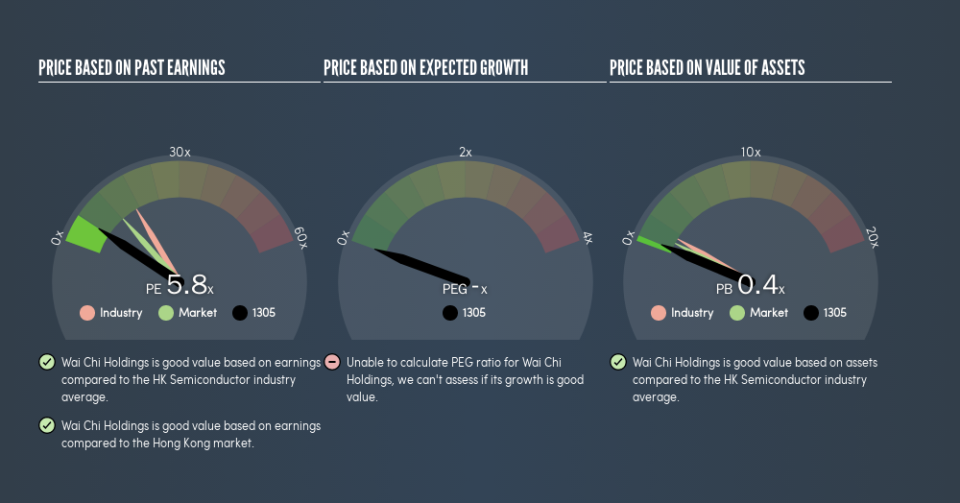Read This Before You Buy Wai Chi Holdings Company Limited (HKG:1305) Because Of Its P/E Ratio

The goal of this article is to teach you how to use price to earnings ratios (P/E ratios). We'll look at Wai Chi Holdings Company Limited's (HKG:1305) P/E ratio and reflect on what it tells us about the company's share price. What is Wai Chi Holdings's P/E ratio? Well, based on the last twelve months it is 5.82. In other words, at today's prices, investors are paying HK$5.82 for every HK$1 in prior year profit.
View our latest analysis for Wai Chi Holdings
How Do I Calculate A Price To Earnings Ratio?
The formula for price to earnings is:
Price to Earnings Ratio = Price per Share ÷ Earnings per Share (EPS)
Or for Wai Chi Holdings:
P/E of 5.82 = HK$1.21 ÷ HK$0.21 (Based on the trailing twelve months to December 2018.)
Is A High Price-to-Earnings Ratio Good?
A higher P/E ratio implies that investors pay a higher price for the earning power of the business. That isn't necessarily good or bad, but a high P/E implies relatively high expectations of what a company can achieve in the future.
How Growth Rates Impact P/E Ratios
Earnings growth rates have a big influence on P/E ratios. If earnings are growing quickly, then the 'E' in the equation will increase faster than it would otherwise. Therefore, even if you pay a high multiple of earnings now, that multiple will become lower in the future. So while a stock may look expensive based on past earnings, it could be cheap based on future earnings.
In the last year, Wai Chi Holdings grew EPS like Taylor Swift grew her fan base back in 2010; the 102% gain was both fast and well deserved. Unfortunately, earnings per share are down 21% a year, over 5 years.
How Does Wai Chi Holdings's P/E Ratio Compare To Its Peers?
We can get an indication of market expectations by looking at the P/E ratio. If you look at the image below, you can see Wai Chi Holdings has a lower P/E than the average (17) in the semiconductor industry classification.
This suggests that market participants think Wai Chi Holdings will underperform other companies in its industry. Many investors like to buy stocks when the market is pessimistic about their prospects. It is arguably worth checking if insiders are buying shares, because that might imply they believe the stock is undervalued.
Remember: P/E Ratios Don't Consider The Balance Sheet
The 'Price' in P/E reflects the market capitalization of the company. Thus, the metric does not reflect cash or debt held by the company. Hypothetically, a company could reduce its future P/E ratio by spending its cash (or taking on debt) to achieve higher earnings.
Such spending might be good or bad, overall, but the key point here is that you need to look at debt to understand the P/E ratio in context.
Is Debt Impacting Wai Chi Holdings's P/E?
Net debt is 41% of Wai Chi Holdings's market cap. While it's worth keeping this in mind, it isn't a worry.
The Verdict On Wai Chi Holdings's P/E Ratio
Wai Chi Holdings's P/E is 5.8 which is below average (12.1) in the HK market. The company hasn't stretched its balance sheet, and earnings growth was good last year. If the company can continue to grow earnings, then the current P/E may be unjustifiably low.
When the market is wrong about a stock, it gives savvy investors an opportunity. As value investor Benjamin Graham famously said, 'In the short run, the market is a voting machine but in the long run, it is a weighing machine.' We don't have analyst forecasts, but you could get a better understanding of its growth by checking out this more detailed historical graph of earnings, revenue and cash flow.
You might be able to find a better buy than Wai Chi Holdings. If you want a selection of possible winners, check out this free list of interesting companies that trade on a P/E below 20 (but have proven they can grow earnings).
We aim to bring you long-term focused research analysis driven by fundamental data. Note that our analysis may not factor in the latest price-sensitive company announcements or qualitative material.
If you spot an error that warrants correction, please contact the editor at editorial-team@simplywallst.com. This article by Simply Wall St is general in nature. It does not constitute a recommendation to buy or sell any stock, and does not take account of your objectives, or your financial situation. Simply Wall St has no position in the stocks mentioned. Thank you for reading.


